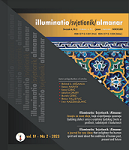The Perfect Man (al-insanu al-kamil) in tafsir, hadith and tasawwuf
The Perfect Man (al-insanu al-kamil) in tafsir, hadith and tasawwuf
Author(s): Mensur ValjevacSubject(s): Theology and Religion, Islam studies, Sociology of Religion, Qur’anic studies
Published by: Centar za dijalog - Vesatijja
Keywords: Perfect Man; Ibn ʿArabī; Sheikh Mustafa-effendi Čolić; Allah's Meaningful Universe;
Summary/Abstract: In this paper, we tried to show the basic characteristics of the Islamic teaching about the "perfect man", which reached its culmination in Islamic spirituality, i.e., taṣawwuf. The Islamic or taṣawwuf teaching of the Perfect Man cannot possibly be linked to a Christian or Buddhist notion of man, which is anthropomorphic. The most perfect man is always a man and a servant of Allah. Every man, according to the Ṣūfīs, can potentially be individually perfect, and the task of such perfect men is to serve other people, striving to make them happy in both worlds, and they are the true heirs of the Prophets. Perfect men are other people's teachers and guides. Bosnian Ṣūfīs inspired by other Ṣūfī scholars also spoke of the Perfect Man in their works. Their teachings are largely based on Ibn ʿArabī and al-Rūmī. They clearly deny any form of pantheism, panentheism, union of God and man, incarnation, becoming God through man, etc. According to them, in addition to a universally Perfect man, there are also individually perfect men who are the only ones worthy of being Prophets and guides to other people, as complete teachers to whom people are obliged to show obedience and devotion. The highest degree of individual perfection is the most complete perfection that belongs to Muḥammad, ṣallallahu ʿalaihi wa sallam, and his complete and perfect successors. Sheikh Mustafa-effendi Čolić, in his teaching on the Perfect Man, uses a new term in the Bosnian language „Allahov obznambeni univerzum“, which may be translated as "Allah's Meaningful Universe." His teaching, too, is based on the teachings of earlier Ṣūfīs, but it also has some new aspects.
Journal: Illuminatio/Svjetionik/Almanar
- Issue Year: 4/2023
- Issue No: 2
- Page Range: 275-303
- Page Count: 17
- Language: English

